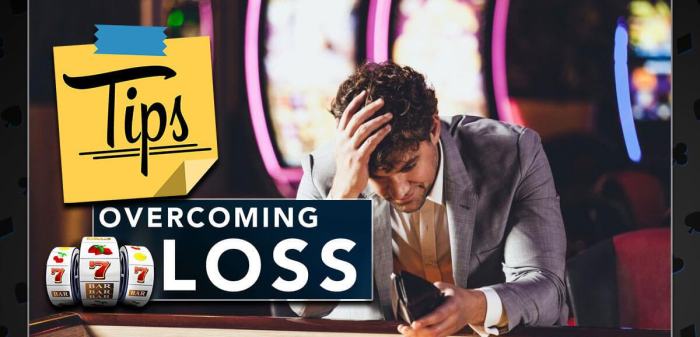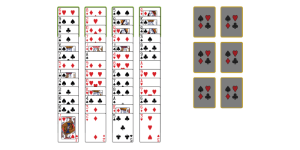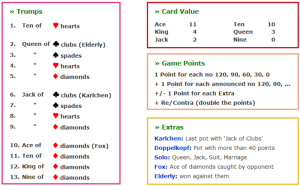
Kicking off with How to manage losses in card games, this guide delves into effective strategies and techniques to handle setbacks and enhance your gameplay experience.
Exploring the key aspects of losses in card games and how players can navigate challenges with resilience and continuous improvement.
Understanding Losses in Card Games

In card games, a loss occurs when a player fails to achieve the objective of the game, resulting in their opponent winning the round or match.
Losses in card games can have a significant impact on players’ strategies and mindset. When faced with a loss, players may need to reassess their tactics, adapt to their opponent’s style, or change their overall approach to the game.
The Emotional Aspect of Dealing with Losses
Dealing with losses in card games can evoke a range of emotions in players. From frustration and disappointment to anger and self-doubt, losing can be a challenging experience emotionally.
Strategies for Managing Losses
When it comes to managing losses in card games, it’s crucial to stay composed and focused. Learning from your losses can actually help you improve your gameplay in the long run. Here are some strategies to help you navigate through losses without getting tilted or frustrated.
Staying Composed After a Loss
- Take a deep breath and remind yourself that losses are a part of the game.
- Acknowledge your emotions, but try not to let them cloud your judgment.
- Focus on the present moment and avoid dwelling on past mistakes.
- Engage in positive self-talk to boost your confidence and motivation.
Learning from Losses to Improve Future Gameplay
- Review your gameplay to identify areas where you can improve.
- Seek feedback from experienced players to gain new perspectives.
- Practice regularly to enhance your skills and strategies.
- Experiment with different tactics and adapt your gameplay based on past losses.
Avoiding Tilt and Frustration
- Take breaks between games to clear your mind and refocus.
- Set realistic goals for yourself and celebrate small victories along the way.
- Avoid blaming external factors for your losses and take ownership of your gameplay.
- Remember that losses are opportunities for growth and learning.
Building Resilience in Card Games
Resilience plays a crucial role in card games, helping players cope with losses, setbacks, and challenges that may arise during gameplay. By developing resilience, players can maintain a positive mindset, adapt to changing circumstances, and ultimately improve their overall performance at the game.
The Importance of Resilience
Resilience in card games allows players to bounce back from losses without getting discouraged or demotivated. It enables them to stay focused, learn from their mistakes, and continue playing with determination and a positive attitude. By building resilience, players can enhance their mental toughness, emotional stability, and ability to handle pressure during intense gaming sessions.
Examples of Resilience in Action
Adapting Strategies
Resilient players can quickly adjust their gameplay strategies based on the current situation, making the necessary changes to turn the game around in their favor.
Maintaining Composure
Resilience helps players remain calm and composed, even in challenging situations, allowing them to make rational decisions and avoid impulsive moves that could lead to further losses.
Learning from Losses
Resilient players view losses as opportunities for growth and improvement, analyzing their mistakes, identifying areas for development, and using setbacks as motivation to enhance their skills.
Exercises to Enhance Resilience
- Practice Mindfulness: Encourage players to stay present in the moment, focus on the game at hand, and avoid dwelling on past losses or future outcomes.
- Set Realistic Goals: Help players establish achievable goals for each gaming session, allowing them to track their progress, celebrate small victories, and stay motivated.
- Engage in Positive Self-Talk: Teach players to challenge negative thoughts, boost their self-confidence, and maintain a positive mindset, even in the face of adversity.
- Seek Feedback: Encourage players to seek feedback from peers, mentors, or experienced gamers, using constructive criticism to improve their skills and enhance their gameplay.
Seeking Support and Feedback

Seeking support and feedback from other players after a loss can be highly beneficial in improving your skills and mindset in card games. It allows you to gain different perspectives, learn from others’ strategies, and identify areas for improvement.
Benefits of Seeking Feedback
- Gain insights: Feedback from other players can provide valuable insights into your gameplay, pointing out mistakes or areas where you can enhance your strategies.
- Emotional support: Sharing your losses with others can help you cope with disappointment and frustration, making it easier to bounce back and continue playing.
- Build relationships: Seeking feedback creates opportunities to connect with other players, exchange ideas, and form a supportive community that fosters growth.
Role of Mentorship or Coaching
- Mentorship: Having a mentor in card games can offer guidance, motivation, and personalized advice to help you navigate losses and improve your skills.
- Coaching: Working with a coach can provide structured training, feedback on specific areas of improvement, and accountability to stay focused on your goals.
- Professional advice: Professional players or coaches can offer expert insights and strategies that can significantly impact your performance and mindset in card games.
Creating a Supportive Community
- Join online forums or communities dedicated to card games to connect with players who share similar interests and experiences.
- Organize friendly gaming sessions or tournaments with friends to create a supportive environment where you can learn from each other’s losses and victories.
- Attend local gaming events or workshops to network with experienced players, seek advice, and build a community of like-minded individuals who can support you in your card game journey.
Analyzing Mistakes and Improving
Identifying and analyzing mistakes in gameplay is crucial for improving performance in card games. By recognizing patterns in losses, players can make informed decisions to adapt their strategies and gameplay.
Identifying Mistakes
- Review game recordings or logs to pinpoint specific moments where errors were made.
- Reflect on decision-making processes during gameplay and identify areas where improvements can be made.
- Seek feedback from experienced players or coaches to gain insights into common mistakes and ways to address them.
Recognizing Patterns
- Look for recurring themes or sequences of events that lead to losses in multiple games.
- Identify common mistakes such as misplays, misreads, or misjudgments that impact gameplay outcomes.
- Keep a log or journal of gameplay experiences to track progress and identify areas for improvement.
Continuous Improvement
- Embrace a growth mindset that values learning from mistakes and constantly seeking ways to improve.
- Experiment with new strategies and techniques to adapt to different game situations and opponents.
- Stay updated on meta-game trends and changes to ensure strategies remain relevant and effective.
Embracing the Learning Experience
When it comes to playing card games, losses are inevitable. However, these losses can actually serve as valuable learning experiences that can help you grow and improve your skills as a player. It’s all about shifting your mindset and viewing losses as opportunities for growth rather than setbacks.
Stories of Valuable Lessons
- One player shared how a particularly devastating loss taught them the importance of strategic planning and adaptability in card games.
- Another player mentioned how a series of losses motivated them to study their opponents’ moves more closely, leading to a significant improvement in their gameplay.
Mindset Shift for Growth
- Embrace losses as opportunities to identify weaknesses in your gameplay and work on improving them.
- View losses as stepping stones towards becoming a more skilled and experienced player rather than as failures.
Extracting Lessons for Improvement
- After a loss, take time to reflect on what went wrong and analyze your decisions during the game.
- Seek feedback from other players or mentors to gain different perspectives on your gameplay and areas for improvement.
- Focus on specific aspects of your gameplay that need work and develop strategies to enhance those areas.
Balancing Risk and Reward
When playing card games, it is essential to understand the concept of risk management to minimize losses and maximize your chances of winning. By finding the right balance between risk-taking and cautious play, you can improve your overall gameplay and increase your chances of success.
Trade-offs Between Conservative and Aggressive Strategies
There are trade-offs between conservative and aggressive gameplay strategies in card games. A conservative approach may involve playing it safe, making fewer risky moves, and focusing on long-term success. On the other hand, an aggressive strategy may involve taking more risks, making bold moves, and aiming for quick victories. Finding the right balance between these two approaches is crucial for achieving optimal results.
Tips for Finding the Right Balance
- Assess the current game situation before making a decision.
- Consider the potential risks and rewards of each move.
- Adapt your gameplay strategy based on your opponents’ behavior.
- Practice different approaches in friendly matches to see what works best for you.
Maintaining a Positive Mindset
Maintaining a positive mindset is crucial when dealing with losses in card games. It can help you stay motivated, focused, and ready to bounce back from setbacks. A positive attitude can also impact your overall gameplay performance, leading to better decision-making and strategic thinking.
Techniques for Staying Positive and Motivated
- Practice gratitude: Focus on the aspects of the game you enjoy and are grateful for, rather than dwelling on losses.
- Visualize success: Imagine yourself achieving your goals and winning games to boost your confidence.
- Take breaks: Step away from the game for a while to clear your mind and come back refreshed.
- Stay optimistic: Believe in your abilities and see losses as opportunities to learn and grow.
Impact of a Positive Mindset on Gameplay Performance
A positive mindset can enhance your gameplay performance by reducing stress, improving focus, and increasing resilience. When you approach games with a positive attitude, you are more likely to make sound decisions, adapt to changing circumstances, and maintain a winning mentality.
Strategies for Reframing Losses as Stepping Stones Towards Success
- Focus on lessons learned: Analyze your losses to identify areas for improvement and adjust your strategies accordingly.
- Set realistic goals: Break down your long-term objectives into smaller, achievable milestones to measure progress and celebrate small victories.
- Acknowledge progress: Recognize your growth and development over time, even if it comes from setbacks and challenges.
- Stay resilient: Embrace setbacks as part of the learning process and remain determined to succeed despite obstacles.
Concluding this discussion on managing losses in card games, remember that setbacks are opportunities for growth and learning. By embracing the right mindset and strategies, you can turn losses into stepping stones towards success.
Helpful Answers
How can losses affect a player’s mindset?
Losses can lead to frustration and tilt if not managed properly. It’s essential to stay composed and learn from each loss to avoid negative impacts on your gameplay.
Why is seeking feedback important after a loss?
Feedback from other players can provide valuable insights into your gameplay and help you identify areas for improvement. It also fosters a sense of community and support in dealing with losses.
What is the significance of analyzing mistakes in card games?
Analyzing mistakes allows players to identify patterns in their losses and work towards continuous improvement. It’s crucial for enhancing gameplay skills and adapting strategies.





